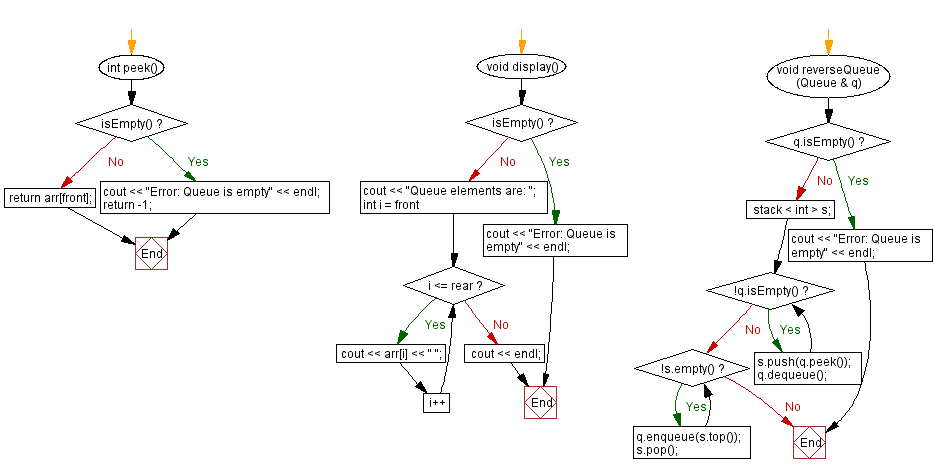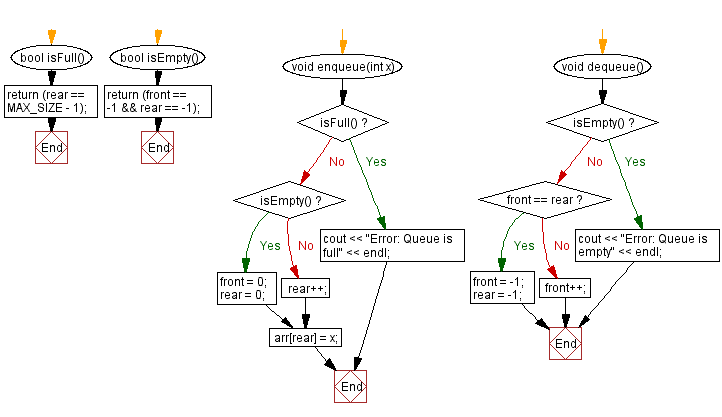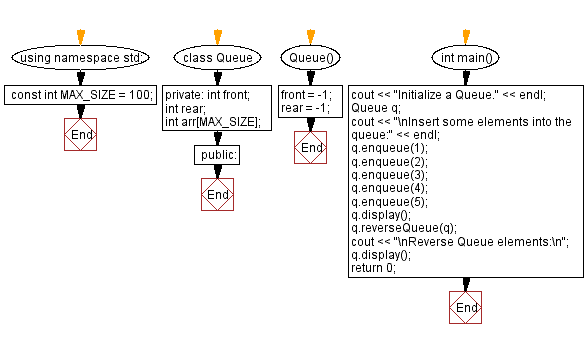C++ Queue Exercises: Reverse the elements of a queue
2. Reverse Queue Elements
Write a C++ program to reverse the elements of a queue.
Sample Solution:
C Code:
#include <iostream>
#include <stack> // Include the stack library for using stacks
using namespace std;
const int MAX_SIZE = 100;
class Queue {
private:
int front;
int rear;
int arr[MAX_SIZE];
public:
Queue() {
front = -1; // Initialize front index to -1
rear = -1; // Initialize rear index to -1
}
bool isFull() {
return (rear == MAX_SIZE - 1); // Check if the queue is full
}
bool isEmpty() {
return (front == -1 && rear == -1); // Check if the queue is empty
}
void enqueue(int x) {
if (isFull()) {
cout << "Error: Queue is full" << endl; // Display error message if queue is full
return;
}
if (isEmpty()) {
front = 0;
rear = 0;
} else {
rear++;
}
arr[rear] = x; // Insert the element at the rear index
}
void dequeue() {
if (isEmpty()) {
cout << "Error: Queue is empty" << endl; // Display error message if queue is empty
return;
}
if (front == rear) {
front = -1;
rear = -1;
} else {
front++;
}
}
int peek() {
if (isEmpty()) {
cout << "Error: Queue is empty" << endl; // Display error message if queue is empty
return -1;
}
return arr[front]; // Return the element at the front of the queue
}
void display() {
if (isEmpty()) {
cout << "Error: Queue is empty" << endl; // Display error message if queue is empty
return;
}
cout << "Queue elements are: ";
for (int i = front; i <= rear; i++) {
cout << arr[i] << " "; // Display all elements in the queue
}
cout << endl;
}
// Function to reverse the elements of the queue
void reverseQueue(Queue & q) {
if (q.isEmpty()) {
cout << "Error: Queue is empty" << endl; // Display error message if queue is empty
return;
}
stack < int > s; // Create a stack to store elements temporarily
while (!q.isEmpty()) {
s.push(q.peek()); // Push each element of the queue to the stack
q.dequeue(); // Remove the element from the queue
}
while (!s.empty()) {
q.enqueue(s.top()); // Enqueue the elements from the stack to the queue
s.pop(); // Pop the element from the stack
}
}
};
int main() {
cout << "Initialize a Queue." << endl;
Queue q;
cout << "\nInsert some elements into the queue:" << endl;
q.enqueue(1);
q.enqueue(2);
q.enqueue(3);
q.enqueue(4);
q.enqueue(5);
q.display();
q.reverseQueue(q); // Reverse the elements of the queue
cout << "\nReverse Queue elements:\n";
q.display();
return 0;
}
Sample Output:
Initialize a Queue. Insert some elements into the queue: Queue elements are: 1 2 3 4 5 Reverse Queue elements: Queue elements are: 5 4 3 2 1
Flowchart:



For more Practice: Solve these Related Problems:
- Write a C++ program to reverse the order of elements in a queue using recursion.
- Write a C++ program to reverse a queue by first transferring its elements into a stack and then back to the queue.
- Write a C++ program that reverses the elements of a queue in groups of k elements.
- Write a C++ program to reverse a queue in-place by swapping front and rear elements iteratively.
Go to:
PREV : Queue Using Array with Enqueue/Dequeue and Status Check.
NEXT : Sort Queue Elements.
CPP Code Editor:
Contribute your code and comments through Disqus.
What is the difficulty level of this exercise?
